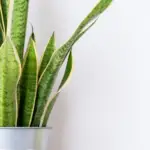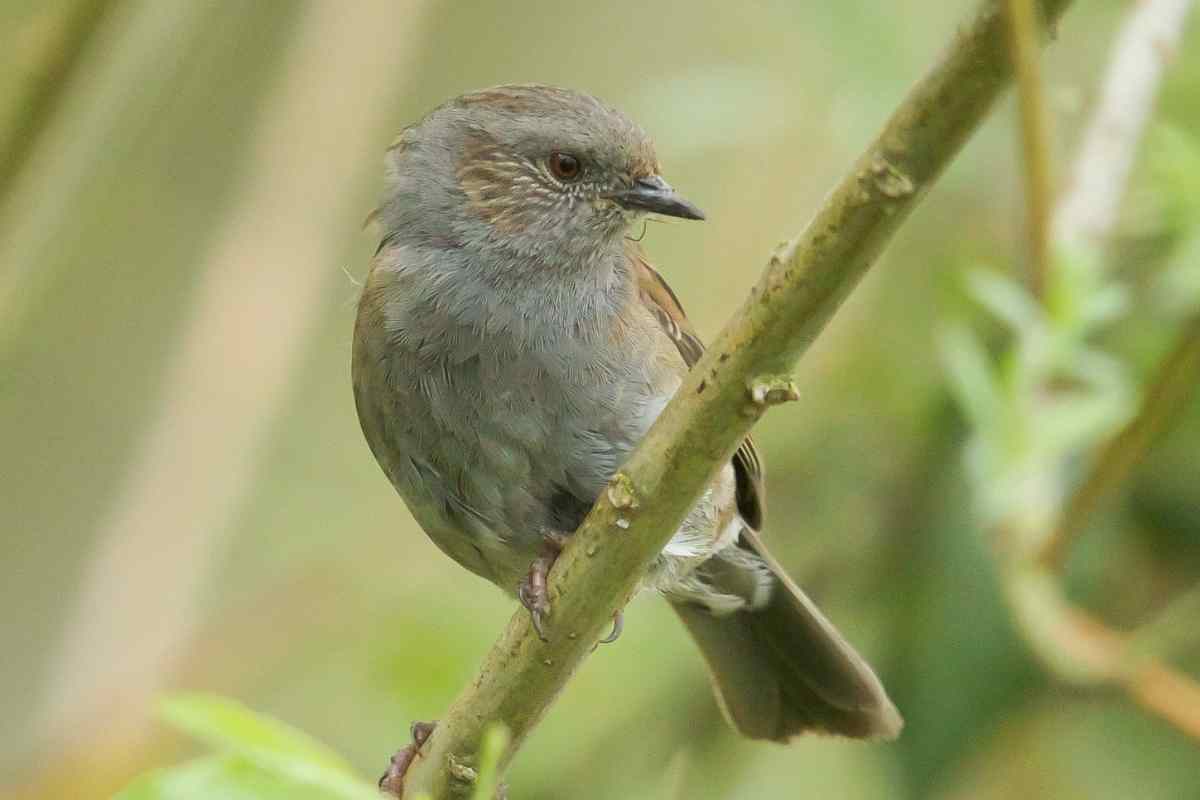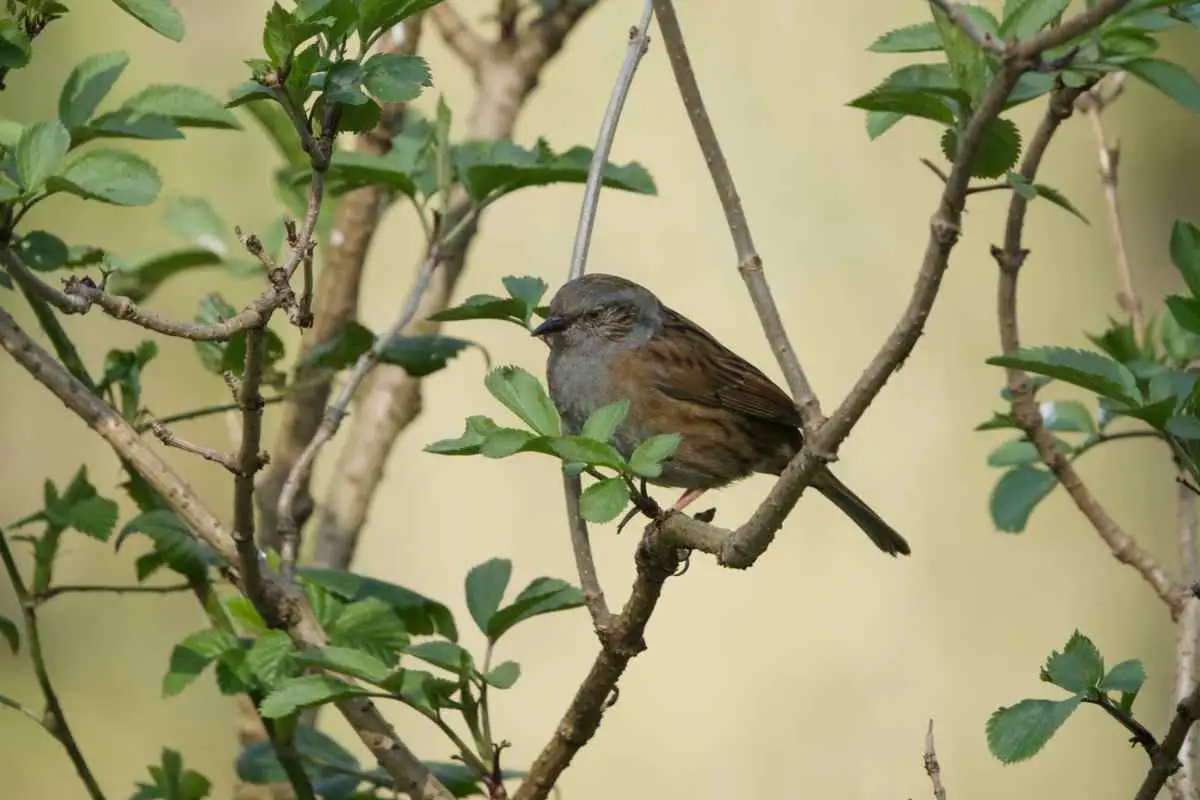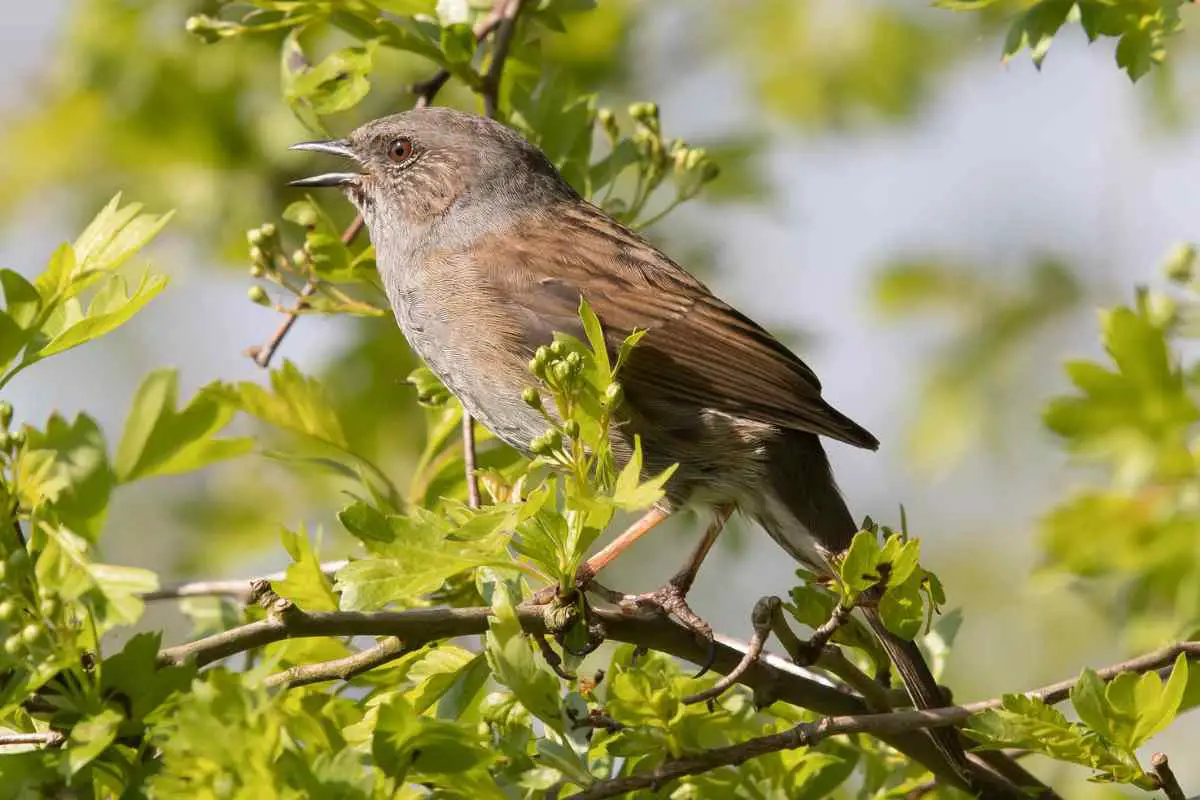Gnats are tiny flying insects that can be a nuisance in the home. They are attracted to moist environments and decaying organic matter, making them common in kitchens and bathrooms.
While vinegar is a popular and effective method for getting rid of gnats, it’s not always the best solution.
In this article, we will explore alternative methods for getting rid of gnats without using vinegar.
One effective way to get rid of gnats without vinegar is by using fruit fly traps. These traps work by attracting gnats with a sweet-smelling bait and then trapping them in a sticky substance.
Fruit fly traps can be purchased at most home and garden stores or made at home using household items like a jar, paper cone, and apple cider vinegar.
Another option for getting rid of gnats without vinegar is to use essential oils. Certain essential oils like peppermint, lavender, and eucalyptus have insect-repelling properties that can help keep gnats away.
Mix a few drops of essential oil with water in a spray bottle and spritz the affected areas. This method is not only effective but also leaves a pleasant aroma in the air.
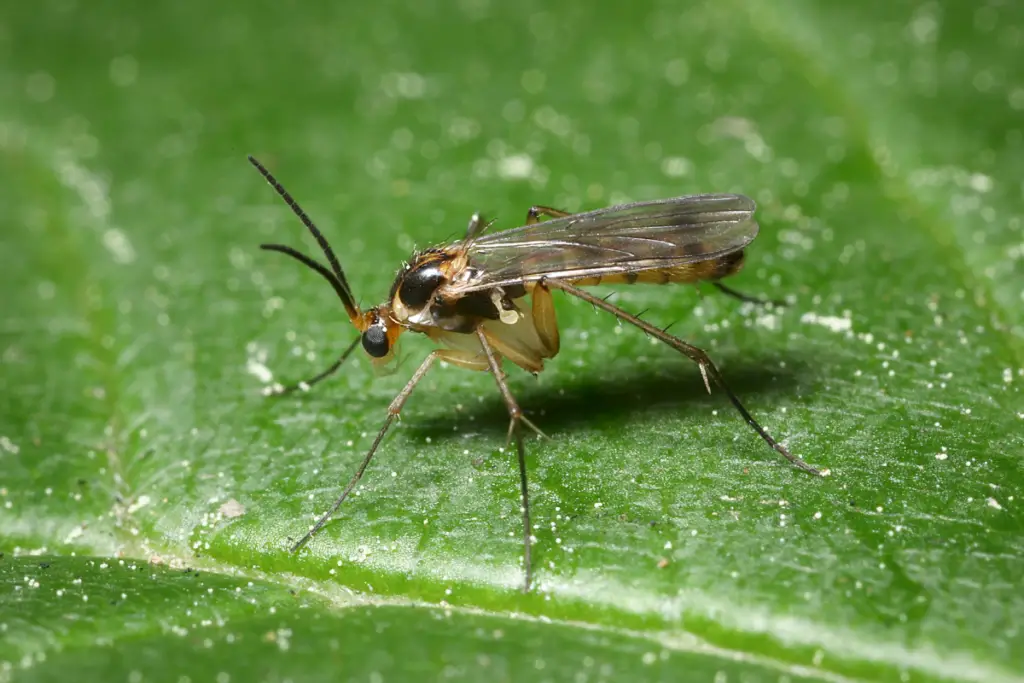
Table of Contents
Understanding Gnats
Gnats are small, flying insects that are often found in and around homes. They are a nuisance and can be difficult to get rid of, especially if they are not dealt with promptly.
Understanding the lifecycle and types of gnats can help in identifying and eliminating them.
Lifecycle of Gnats
Gnats have a relatively short lifecycle, which makes them reproduce quickly.
The lifecycle of gnats consists of four stages: egg, larva, pupa, and adult. The eggs are laid in moist soil, decaying organic matter, or standing water.
After hatching, the larvae feed on the organic matter in the soil and pupate before emerging as adults. The entire lifecycle can take as little as two weeks.
Types of Gnats
There are several types of gnats, and each has a unique appearance and behavior. Some of the most common types of gnats include:
- Fungus Gnats: These gnats are often found around overwatered houseplants when organic matter in the soil starts to decay. Their larvae feed on plant roots, causing leaves to turn yellow and drop or entire plants to wilt and die.
- Fruit Flies: Fruit flies are small, brownish-yellow flies that are attracted to ripe or rotting fruit. They are often found in kitchens and pantries.
- Drain Flies: Drain flies are small, moth-like flies that are attracted to standing water and organic matter. They are often found near sinks, showers, and other areas with standing water.
- Phorid Flies: Like drain flies, phorids hang around garbage, drains, and rotting fruits and vegetables.
Understanding the lifecycle and types of gnats is essential in identifying and eliminating them.
By knowing their habits and behaviors, it is easier to prevent infestations and get rid of them quickly and effectively.
Preventive Measures
Gnats can be a nuisance, but there are some preventive measures that can be taken to keep them at bay.
The following sub-sections outline some of the best ways to prevent gnats from infesting your home.
Maintain Cleanliness
Keeping your home clean is one of the most effective ways to prevent gnats from entering. Gnats are attracted to moist and organic matter, so it’s important to clean up any spills or food scraps as soon as possible.
This includes wiping down counters, cleaning dishes promptly, and sweeping or vacuuming regularly.
In addition, it’s important to keep drains and garbage disposals clean and free of debris.
Proper Food Storage
Gnats are attracted to ripe or rotting fruits and vegetables, so it’s important to store them properly.
Keep fruits and vegetables in the refrigerator or in airtight containers to prevent gnats from getting to them.
It’s also important to clean up any spills or crumbs in the kitchen, as these can attract gnats as well.
Plant Care
If you have indoor plants, it’s important to take care of them properly to prevent gnats from infesting the soil.
Overwatering can create a moist environment that is attractive to gnats, so it’s important to water plants only when they need it. In addition, it’s important to remove any dead leaves or debris from the soil, as this can attract gnats as well.
By following these preventive measures, it’s possible to keep gnats at bay and prevent them from infesting your home.
Natural Methods
When it comes to getting rid of gnats without vinegar, there are several natural methods one can try. These methods are not only effective but also safe and eco-friendly.
Using Citronella
Citronella is a natural insect repellent that can be used to get rid of gnats. It is available in the form of candles, sprays, and essential oils.
Citronella candles are effective in repelling gnats and can be used both indoors and outdoors.
Simply light the candle and place it in the affected area. Citronella essential oil can also be used to make a spray. Mix a few drops of citronella oil with water and spray it in the infested area.
- 100% PURE & NATURAL CITRONELLA OIL - Handcraft Blends oils are exactly that! Many oils being sold make that claim but are in fact made of natural isolates and mixtures. Each essential oil is tested by an independent lab which is why every bottle comes with a Quality Guaranty.
- PREMIUM THERAPEUTIC GRADE & PREMIUM QUALITY – All Handcraft Blends Essential Oils are tested by an independent lab to test the efficacy of each oil. Each oil is tested for its constituents as well as to have no fillers, additives and to be undiluted.
- HIGH QUALITY GLASS BOTTLE AND DROPPER – Our essential oil comes in an amber glass bottle to keep out UV rays and protect the oil against sunlight. We also provide a glass dropper, so you get the exact amount of oil without any waste.
- CITRONELLA OIL BLENDS WELL WITH – Bergamot, Cedarwood, Eucalyptus, Lavender, Lemon, Orange, Peppermint and Pine.
- BOTTLED IN THE USA – Our oils are sourced from the best regions all over the world to bring you the best and fine
Prices pulled from the Amazon Product Advertising API on:
Product prices and availability are accurate as of the date/time indicated and are subject to change. Any price and availability information displayed on [relevant Amazon Site(s), as applicable] at the time of purchase will apply to the purchase of this product.
Essential Oils
Essential oils such as lavender, peppermint, and eucalyptus are effective in repelling gnats. These oils can be used in the form of sprays, diffusers, or candles.
To make a spray, mix a few drops of essential oil with water and spray it in the affected area.
Essential oil diffusers can also be used to repel gnats. Simply add a few drops of essential oil to the diffuser and turn it on.
Diatomaceous Earth
Diatomaceous earth is a natural insecticide that can be used to get rid of gnats. It is made from the fossilized remains of diatoms and is available in the form of a powder.
Diatomaceous earth works by dehydrating the gnats and killing them. Simply sprinkle the powder in the affected area and leave it for a few days. Vacuum the area after a few days to remove the dead gnats.
Overall, natural methods are a safe and effective way to get rid of gnats without vinegar.
Using citronella, essential oils, and diatomaceous earth are just a few examples of natural methods that one can use to get rid of gnats.
- Natural Product - Composed of 4lbs of 100% ground freshwater diatomaceous earth with absolutely no additives or fillers.
- OMRI Listed - Listed with the Organic Minerals Research Institute, a non-profit organization that reviews products against organic standards.
- Powder Duster Included - Powder duster in the bag for easy and efficient application of diatomaceous earth on animal feed
- Supports a Great Cause - Harris donates 10% of profits to support the local Etowah Valley Humane Society.
- Made in the USA – Mined in Nevada and packaged in Geor
Prices pulled from the Amazon Product Advertising API on:
Product prices and availability are accurate as of the date/time indicated and are subject to change. Any price and availability information displayed on [relevant Amazon Site(s), as applicable] at the time of purchase will apply to the purchase of this product.
Commercial Solutions
If you’re dealing with a particularly stubborn gnat infestation, you may want to consider using commercial solutions.
These products are formulated to be effective against gnats and other common household pests, and they may be more convenient than making your own homemade remedies.
Gnat Traps
One popular commercial solution for getting rid of gnats is the gnat trap. These traps work by using a sweet-smelling bait to attract gnats, which then become trapped inside the device.
Some gnat traps use a sticky surface to capture the insects, while others rely on a physical barrier to prevent the gnats from escaping.
There are many different types of gnat traps available, from simple sticky traps to more complex electronic devices.
Some traps are designed for indoor use, while others are intended for outdoor environments. When choosing a gnat trap, it’s important to consider your specific needs and the severity of your infestation.
Insecticides
Another option for getting rid of gnats is to use an insecticide. These products are designed to kill gnats and other insects on contact, and they can be effective in reducing the population of gnats in your home or yard.
There are many different types of insecticides available, including sprays, baits, and foggers. Some insecticides are designed for indoor use, while others are intended for outdoor environments.
When using an insecticide, it’s important to follow the manufacturer’s instructions carefully and to take appropriate safety precautions.
It’s worth noting that while insecticides can be effective, they may also have negative environmental impacts.
Some insecticides can harm beneficial insects like bees and butterflies, and they may also contaminate soil and water sources.
If you choose to use an insecticide, be sure to use it responsibly and only as directed.
Professional Help
If the gnats infestation persists despite the DIY methods, it may be time to call in the professionals. Pest control companies have the expertise and equipment to handle gnat infestations effectively.
When choosing a pest control company, it’s essential to do your research and find a reputable and experienced one.
Look for companies that offer a guarantee on their services and have positive reviews from previous customers.
It’s also essential to ask about their methods and ensure that they use safe and environmentally friendly products.
Professional pest control services can be costly, but they are often worth the investment for severe or persistent gnat infestations.
The pest control technician will assess the situation and recommend the best course of action, which may include using insecticides, traps, or other methods.
It’s crucial to follow the technician’s instructions carefully and take any necessary precautions, such as removing pets and covering food and dishes.
The technician may also recommend follow-up visits to ensure that the infestation has been eradicated entirely.
Overall, if the DIY methods don’t work, it’s best to seek professional help to get rid of gnats effectively and safely.
Conclusion
In conclusion, getting rid of gnats without vinegar is possible and can be done using several effective methods. The key is to identify the type of gnat and the source of the infestation to choose the most appropriate method.
Some effective ways of getting rid of gnats include using fruit fly traps, gnat traps, and sticky traps.
These traps are easy to make using household items and are an effective way of trapping and killing gnats.
Another effective method is to use essential oils such as peppermint, lavender, and eucalyptus, which repel gnats and can be used in a diffuser or as a spray.
Prevention is also key in getting rid of gnats. Keeping the house clean and dry, fixing leaky pipes, and disposing of garbage properly can help prevent gnats from infesting the house.
Additionally, using screens on windows and doors and keeping the house well-ventilated can also help prevent gnats from entering the house.
Overall, getting rid of gnats without vinegar requires patience and persistence. By identifying the type of gnat and the source of the infestation, using effective methods, and practicing prevention, it is possible to get rid of gnats and prevent future infestations.
- How to Dry Basil Leaves: A Professional Guide
- Is an Avocado a Fruit or Vegetable? Simple Answer and Explanation
- Does Pineapple Have Seeds? Exploring the Anatomy of Pineapples
- Blooming Through Winter: Can I Grow Vegetables Indoors in the Winter?
- What Can You Grow in a Greenhouse All Year Round: A Guide to Year-Round Greenhouse Gardening
- Are Blueberries Blue? Debunking the Myth of Their Color














